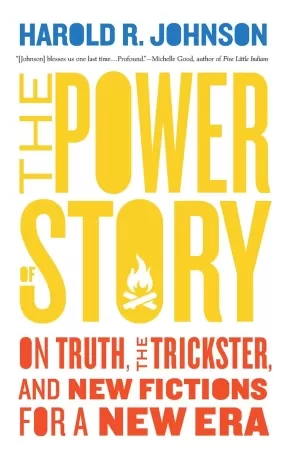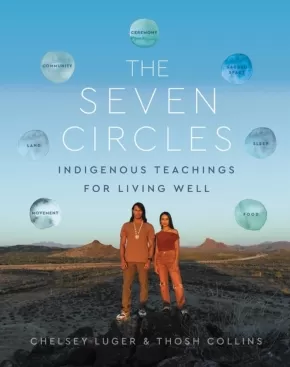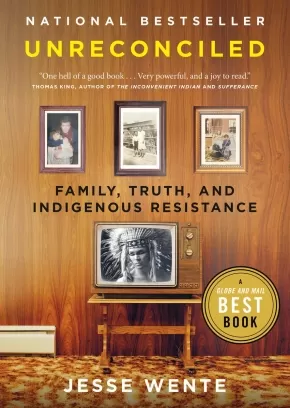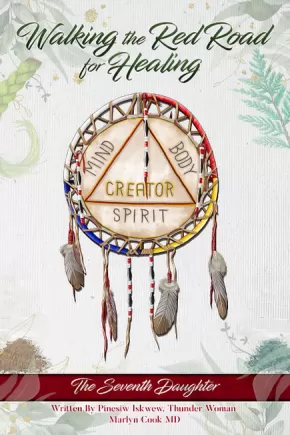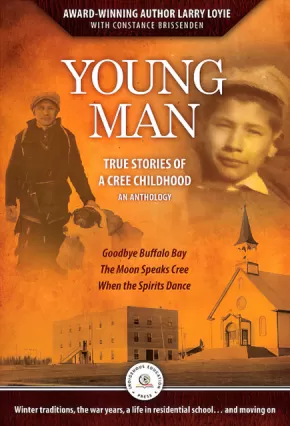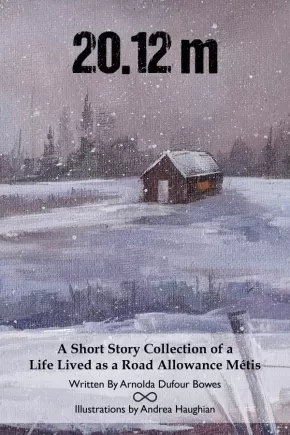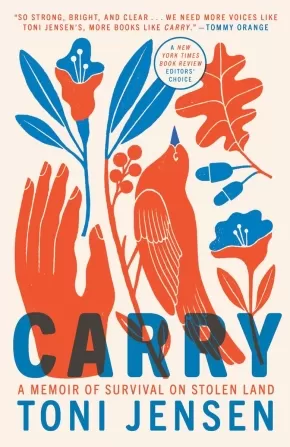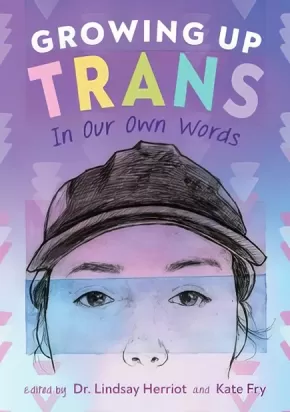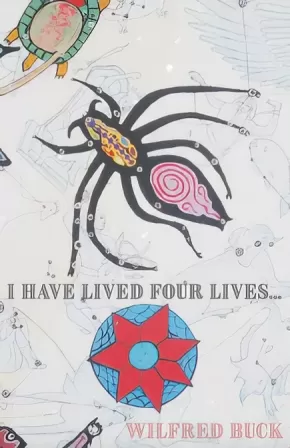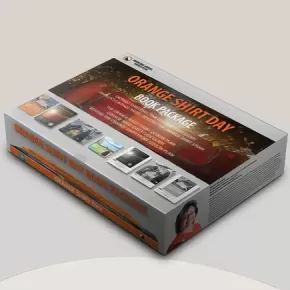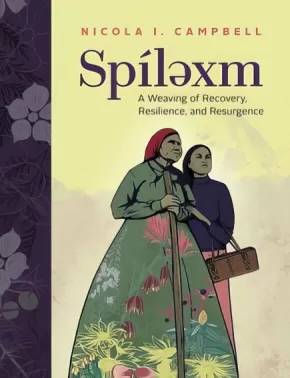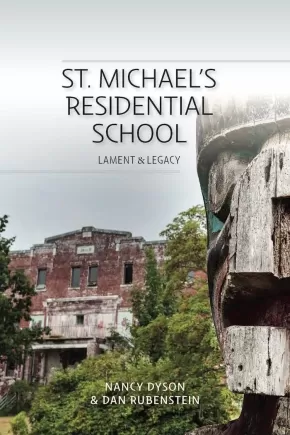
Personal Narratives
31
-
45
of
85 Results;
Sort By
Go To
of 6
The Power of Story: On Truth, the Trickster, and New Fictions for a New Era
$22.95
Format:
Paperback
Text Content Territories:
Indigenous Canadian; First Nations; Cree (Nehiyawak); Woodland Cree; Rocky Cree; Montreal Lake Cree;
Grade Levels: 12; University/College;
ISBN / Barcode: 9781771964876
Synopsis:
Synopsis:
Award-winning Indigenous author Harold R. Johnson discusses the promise and potential of storytelling.
Approached by an ecumenical society representing many faiths, from Judeo-Christians to fellow members of First Nations, Harold R. Johnson agreed to host a group who wanted to hear him speak about the power of storytelling. This book is the outcome of that gathering. In The Power of Story, Johnson explains the role of storytelling in every aspect of human life, from personal identity to history and the social contracts that structure our societies, and illustrates how we can direct its potential to re-create and reform not only our own lives, but the life we share. Companionable, clear-eyed, and, above all, optimistic, Johnson’s message is both a dire warning and a direct invitation to each of us to imagine and create, together, the world we want to live in.
Reviews
"Recently in conversation with a friend I remarked that the whole world is a story. Harold Johnson fills that phrase with profound meaning in The Power of Story as he takes ancient figures and modernizes their storied wit and role in creating the worlds we perceive and the boundaries we need. Harold blessed us one last time with a profound conversation on the role of story in every aspect of our lives."—Michelle Good, author of Five Little Indians
“The Power of Story begins where all great stories begin: around a fire. Harold Johnson gives us a seat at the fire to listen and take into ourselves some spellbinding, bracing, and provocative stories told with a view to healing and transforming. As Harold writes ‘It’s starting to get darker now, and a bright fire will help.’ The Power of Story is that bright fire. And it will help. His final book is a balm for our times.”—Shelagh Rogers
Additional Information
192 pages | 5.00" x 8.00" | Paperback
The Seven Circles: Indigenous Teachings for Living Well
$36.99
Format:
Hardcover
Text Content Territories:
Indigenous American; Native American; Sioux; Pima (Akimel O'odham); Osage; Haudenosaunee (Iroquois); Seneca; Cayuga; Anishinaabeg; Ojibwe (Chippewa); Turtle Mountain Anishinaabe;
Grade Levels: 12; University/College;
ISBN / Barcode: 9780063119208
Synopsis:
Synopsis:
In this revolutionary self-help guide, two beloved Native American wellness activists offer wisdom for achieving spiritual, physical, and emotional wellbeing rooted in Indigenous ancestral knowledge.
When wellness teachers and husband-wife duo Chelsey Luger and Thosh Collins founded their Indigenous wellness initiative, Well for Culture, they extended an invitation to all to honor their whole self through Native wellness philosophies and practices. In reclaiming this ancient wisdom for health and wellbeing—drawing from traditions spanning multiple tribes—they developed the Seven Circles, a holistic model for modern living rooted in timeless teachings from their ancestors. Luger and Collins have introduced this universally adaptable template for living well to Ivy league universities and corporations like Nike, Adidas, and Google, and now make it available to everyone in this wise guide.
The Seven Circles model comprises interconnected circles that keep all aspects of our lives in balance, functioning in harmony with one another. They are:
- Food
- Movement
- Sleep
- Ceremony
- Sacred Space
- Land
- Community
In The Seven Circles, Luger and Collins share intimate stories from their life journeys growing up in tribal communities, from the Indigenous tradition of staying active and spiritually centered through running and dance, to the universal Indigenous emphasis on a light-filled, minimalist home to create sacred space. Along the way, Luger and Collins invite readers to both adapt these teachings to their lives as well as do so without appropriating and erasing the original context, representing a critical new ethos for the wellness space. Each chapter closes with practical advice on how to engage with the teachings, as well as wisdom for keeping that particular circle in harmony with the others.
With warmth and generosity—and 75 atmospheric photographs by Collins throughout—The Seven Circles teaches us how to connect with nature, with our community, and with ourselves, and to integrate ancient Indigenous philosophies of health and wellbeing into our own lives to find healing and balance.
Reviews
“A life-changing holistic guide to wellness rooted in empowerment, resiliency, and ‘good medicine.’ This book is for any human being searching for wellness solutions in a chaotic world, a true antidote to colonization.” — Vina Brown, Indigenous Scholar, Entrepreneur, Artist, and Professor of Indigenous Studies at Northwest Indian College
“The Seven Circles is a true innovation in Indigenous thought; it brings our shared heritage and traditional teachings to life. Truly inspiring. Readers will find their journey to be a motivating guide for self-transformation.” — Taiaiake Alfred, Mohawk Philosopher
“While the term ‘wellness’ has been co-opted and diluted by (primarily white) social media influencers in recent years, Luger and Collins are recentering the conversation around how to use Indigenous cultural values, foods, and modalities of movement as tools for spiritual, mental, physical, and emotional healing.” — Vanity Fair
“[Two of the] faces in the health and wellness scene that are pushing for inclusivity, justice, and kindness, toppling old conventions to make their own…Luger and Collins rewrite modern narratives regarding Native health while addressing complex histories and ongoing disparities.” — Outside magazine
“Spellbinding. This may be the first book I’ve ever read that made me stop and decide, “I’m making this change now!” Seven Circles opened my eyes to a way of life that is tested by time, guided by nature, and urgently needed today." — Christopher McDougall, author of Born to Run, Natural Born Heroes, and Running with Sherman
“Wisdom abounds in this stimulating offering.” — Publishers Weekly
“Luger and Collins provide a range of sensible, informed, accessible guidance for both small- and large-scale lifestyle changes. An appealing manual for healing the self through Indigenous traditions.” — Kirkus Reviews
Additional Information
256 pages | 7.00" x 9.00" | 75 Colour Photos | Hardcover
Unreconciled: Family, Truth, and Indigenous Resistance (PB)
$22.00
Format:
Paperback
Text Content Territories:
Indigenous Canadian; First Nations; Anishinaabeg; Ojibway; Serpent River First Nation;
Reading Level: N/A
ISBN / Barcode: 9780735235755
Synopsis:
Synopsis:
A prominent Indigenous voice uncovers the lies and myths that affect relations between white and Indigenous peoples and the power of narrative to emphasize truth over comfort.
Part memoir and part manifesto, Unreconciled is a stirring call to arms to put truth over the flawed concept of reconciliation and to build a new, respectful relationship between the nation of Canada and Indigenous peoples.
Jesse Wente remembers the exact moment he realized that he was a certain kind of Indian--a stereotypical cartoon Indian. He was playing softball as a child when the opposing team began to war-whoop when he was at bat. It was just one of many incidents that formed Wente's understanding of what it means to be a modern Indigenous person in a society still overwhelmingly colonial in its attitudes and institutions.
As the child of an American father and an Anishinaabe mother, Wente grew up in Toronto with frequent visits to the reserve where his maternal relations lived. By exploring his family's history, including his grandmother's experience in residential school, and citing his own frequent incidents of racial profiling by police who'd stop him on the streets, Wente unpacks the discrepancies between his personal identity and how non-Indigenous people view him.
Wente analyzes and gives voice to the differences between Hollywood portrayals of Indigenous peoples and lived culture. Through the lens of art, pop culture, and personal stories, and with disarming humour, he links his love of baseball and movies to such issues as cultural appropriation, Indigenous representation and identity, and Indigenous narrative sovereignty. Indeed, he argues that storytelling in all its forms is one of Indigenous peoples' best weapons in the fight to reclaim their rightful place.
Wente explores and exposes the lies that Canada tells itself, unravels "the two founding nations" myth, and insists that the notion of "reconciliation" is not a realistic path forward. Peace between First Nations and the state of Canada can't be recovered through reconciliation--because no such relationship ever existed.
Reviews
"Unreconciled is one hell of a good book. Jesse Wente’s narrative moves effortlessly from the personal to the historical to the contemporary. Very powerful, and a joy to read."—Thomas King, author of The Inconvenient Indian and Sufferance
“With Unreconciled, Jesse Wente proves himself to be one of the most influential Anishinaabe thinkers of our time. By telling his own story, Jesse provides Canada with an essential roadmap of how to move forward through the myth of reconciliation towards the possibility of a just country. There is much work to be done but reading Jesse’s words, soaking them in and letting them settle in your mind, will set us all on the right path.”—Tanya Talaga, bestselling author of Seven Fallen Feathers
“Mahsi cho, Jesse Wente, for illuminating the biggest issue facing Canada’s relationship with Indigenous people: Canada fears Indigenous people because Canada is terrified of our power. Each language class, culture camp, graduation ceremony, each Supreme Court Ruling, each Treaty (that wasn't forged), each feast and naming ceremony… is part of the incredible Reclaiming happening right now. Please read this book. It's an infuriating read but a necessary one.”—Richard Van Camp, author of The Lesser Blessed and Moccasin Square Gardens
"With Unreconciled, Jesse Wente proves he's a storyteller through and through—one who is unafraid of telling hard but necessary truths, yes, but also one who knows that vulnerability is the quickest way to the heart. Wente shares so generously with his readers in this book, braiding together his own past with the problems of the present, ultimately offering us a way forward, together."—Alicia Elliott, author of A Mind Spread Out on the Ground
Additional Information
208 pages | 5.10" x 7.98" | Paperback
Walking the Red Road for Healing: The Seventh Daughter
$29.99
Format:
Paperback
Text Content Territories:
Indigenous Canadian; First Nations; Cree (Nehiyawak); Swampy Cree ; Misipawistik Cree Nation;
Grade Levels: 12; University/College;
ISBN / Barcode: 9781990297243
Synopsis:
Synopsis:
Pinesiw Iskwew, Thunder Woman, Dr. Marlyn Cook, member of Misipawistik Cree Nation is the author of Walking the Red Road for Healing. This book is based on her life and journey as a Cree Woman, Pipe Carrier, Sundancer, Sweat Lodge Keeper, and medical doctor (graduate MD 1987). She believes the approach for healing must be holistic and that our Traditional Healers work alongside physicians in our Indigenous communities. Dr. Marlyn Cook shares her own experiences of colonialism and how this affected her, her family and her community. Through her reflections of her Indigenous Knowledge, her Traditional Teachings of Ceremonies and Medicines, she acknowledges the resilience of communities in their healing and provides ways to heal. Dr. Cook’s intention in this powerful book is to bring us together in Truth and Reconciliation. This book will resonate with health, social, and justice prac
Educator Information
Keywords / Themes: Adult Education, Health & Healing, Traditional Teachings, Indigenous Knowledge, Truth and Reconciliation.
Additional Information
Pages: 200 | Paperback
Young Man: True Stories of a Cree Childhood: An Anthology
$14.99
Format:
Paperback
Text Content Territories:
Indigenous Canadian; First Nations; Cree (Nehiyawak);
ISBN / Barcode: 9781990297304
Synopsis:
Synopsis:
Larry Loyie, award-winning Cree author, educator, and playwright writes honestly, tenderly, with laughter as well as sadness about his traditional childhood interrupted by six years in residential school. Three books in the Lawrence Series are included in Young Man, True Stories of a Cree Childhood. This book includes 53 photographs from the author’s life.
Educator Information
Recommended for grades 4 to 9.
This anthology includes three books:
- Goodbye Buffalo Bay
- The Moon Speaks Cree
- When the Spirits Dance
Additional Information
200 Pages | Paperback
20.12m: A Short Story Collection of a Life Lived as a Road Allowance Métis
$20.00
Artists:
Format:
Paperback
Text Content Territories:
Indigenous Canadian; Métis;
ISBN / Barcode: 978-1-926795-99-7
Synopsis:
Synopsis:
20.12m: A Short Story Collection of a Life Lived as a Road Allowance Métis celebrates and acknowledges the humble living conditions of Métis Road Allowance families and it exemplifies their grit and tenacity to survive and indeed succeed in the face of so many hardships. “20.12m” refers to the narrow width of many of the road allowances throughout the prairies. This unoccupied crown land became one of the meagre options for many impoverished Métis families as so few owned land.
In this passionate coming of age book, Arnolda Dufour Bowes honours the true-life experiences of her father, Arnold Charles Dufour, a resident of the Punnichy, Saskatchewan Road Allowance community. The strength of the oral tradition has kept these stories solidly in place in Arnolda’s memory. Weaving true elements with those drawn from her own creativity, these five engaging stories share a lived experience that is little-known to most Canadians. This collection of cherished remembrances of this Métis family will also strongly resonate with many other Métis families who lived similar lives. In keeping with the family focus, Arnolda’s sister, Andrea Haughian, skillfully complements these poignant stories with expressive illustrations, which both honour and richly portray road allowance life.
Educator Information
Recommended by publisher for secondary, post-secondary, and adult readers.
Additional Information
Paperback
Allies: Real Talk About Showing Up, Screwing Up, And Trying Again
$21.99
Editors:
Format:
Hardcover
ISBN / Barcode: 9780744039917
Synopsis:
Synopsis:
This book is for everyone. Because we can all be allies.
As an ally, you use your power—no matter how big or small—to support others. You learn, and try, and mess up, and try harder. In this collection of true stories, 17 critically acclaimed and bestselling YA authors get real about being an ally, needing an ally, and showing up for friends and strangers.
From raw stories of racism and invisible disability to powerful moments of passing the mic, these authors share their truths. They invite you to think about your own experiences and choices and how to be a better ally.
There are no easy answers, but this book helps you ask better questions. Self-reflection prompts, resources, journaling ideas, and further reading suggestions help you find out what you can do. Because we’re all in this together. And we all need allies.
A portion of the proceeds from this book goes to supporting charities.
Educator Information
Recommended for ages 12+
A new anthology helps young adult readers become better allies.
Additional Information
240 pages | 6.38" x 9.50" | Hardcover
Beyond the Orange Shirt Story
$19.99
Format:
Paperback
Text Content Territories:
Indigenous Canadian; First Nations; Salish; Interior Salish; Secwepemc (Shuswap); Stswecem'c Xgat'tem;
ISBN / Barcode: 9781989122754
Synopsis:
Synopsis:
Beyond the Orange Shirt Story: A collection of stories from family and friends of Phyllis Webstad - Before, during, and after their Residential School experiences.
Beyond the Orange Shirt Story is a unique collection of truths, as told by Phyllis Webstad's family and others, that will give readers an up-close look at what life was like before, during, and after their Residential School experiences. In this book, Survivors and Intergenerational Survivors share their stories authentically and in their own words. Phyllis Webstad is a Residential School Survivor and founder of the Orange Shirt Day movement. Phyllis has carefully selected stories to help Canadians educate themselves and gain a deeper understanding of the impacts of the Residential School System. Readers of this book will become more aware of a number of challenges faced by many Indigenous peoples in Canada. With this awareness comes learning and unlearning, understanding, acceptance, and change. Phyllis's hope is that all Canadians honour the lives and experiences of Survivors and their families as we go Beyond the Orange Shirt Story.
Educator Information
This book gives readers an up-close look at what life was like for many Survivors — before, during, and after their Residential School experiences. These personal Survivor accounts, relayed in a number of one on one interviews, are authentically shared in their own voices.
Young Adult Nonfiction (Ages 12+).
This book has a Teacher Lesson Plan: Beyond the Orange Shirt Story Teacher Lesson Plan
This book is available in French: Derrière l'histoire du chandail orange
Additional Information
100 pages | 5.50" x 8.50" | Paperback
Carry: A Memoir of Survival on Stolen Land
$24.00
Format:
Paperback
Text Content Territories:
Indigenous American; Métis;
Grade Levels: 12; University/College;
ISBN / Barcode: 9781984821201
Synopsis:
Synopsis:
Toni Jensen grew up around guns: As a girl, she learned to shoot birds in rural Iowa with her father, a card-carrying member of the NRA. As an adult, she’s had guns waved in her face near Standing Rock, and felt their silent threat on the concealed-carry campus where she teaches. And she has always known that in this she is not alone. As a Métis woman, she is no stranger to the violence enacted on the bodies of Indigenous women, on Indigenous land, and the ways it is hidden, ignored, forgotten.
In Carry, Jensen maps her personal experience onto the historical, exploring how history is lived in the body and redefining the language we use to speak about violence in America. In the title chapter, Jensen connects the trauma of school shootings with her own experiences of racism and sexual assault on college campuses. “The Worry Line” explores the gun and gang violence in her neighborhood the year her daughter was born. “At the Workshop” focuses on her graduate school years, during which a workshop classmate repeatedly killed off thinly veiled versions of her in his stories. In “Women in the Fracklands,” Jensen takes the reader inside Standing Rock during the Dakota Access Pipeline protests and bears witness to the peril faced by women in regions overcome by the fracking boom.
In prose at once forensic and deeply emotional, Toni Jensen shows herself to be a brave new voice and a fearless witness to her own difficult history—as well as to the violent cultural landscape in which she finds her coordinates. With each chapter, Carry reminds us that surviving in one’s country is not the same as surviving one’s country.
Reviews
“Like a murmuration of starlings, Toni Jensen’s new book Carry changes its shape constantly and effortlessly. . . . The value of Carry lies in its unique structure, its sparse, powerful prose, and in the stinging perspective it provides on events that are numbingly common. Until we see it as clearly as Jensen does, the lens she offers on gun violence in America will be relevant again and again and again.”—Chicago Review of Books
“In Carry, Jensen scours language to find a new way of writing about how historical injustices seep into the present. . . . With a controlled voice like a Philip Glass composition, smooth, meandering yet repetitive, Jensen considers her troubled past and begins the work of stitching herself back together. . . . An unsettling account that creeps into your bones.”—The New York Times Book Review
“Toni Jensen grew up around guns. But bird-hunting with her father was a much different experience than staring down bored barrels at Standing Rock. A new and much-needed voice, Métis author Jensen shares her deepest thoughts and most emotional experiences in Carry.”—Bustle
“Toni Jensen’s memoir is stunning. There’s no other words that come to mind—it’s about growing up Métis, existing as an Indigenous woman in America, and the looming threat of ever-pervasive gun violence. . . . A must-read.”—Alma (Alma’s Favorite Books for Fall 2020)
“Moving between personal recollections and historical observations, Jensen narrates what it means to be Métis, and what it feels like to be connected by bodies and land. . . . A meditative exploration of people and place that shows what it means to live and survive.”—Library Journal
“[A] debut memoir from a Native author enmeshed in the American way of violence, alienation, and death . . . a powerful rejection of a culture that has always been grounded in violence and intimidation.”—Kirkus Reviews
“Carry explores the gun’s tragic impact with heartfelt prose and deep intellect—on politics, on history, on Black and Indigenous bodies, on women’s bodies, and on children behind closed doors . . . It is full of difficult and vital news, delivered right on time.”—Terese Marie Mailhot, New York Times bestselling author of Heart Berries
Additional Information
304 pages | 5.24" x 7.94" | Paperback
Growing Up Trans: In Our Own Words
$24.95
Editors:
Format:
Paperback
ISBN / Barcode: 9781459831377
Synopsis:
Synopsis:
What does it mean to be young and transgender today? Growing Up Trans shares stories, essays, art and poetry created by trans youth aged 11 to 18. In their own words, the works illustrate the trans experience through childhood, family and daily life, school, their bodies and mental health. Together the collection is a story of the challenges, big and small, of being a young trans person. At the same time, it’s a toolkit for all young people, transgender or not, about what understanding, acceptance and support for the trans community looks like. In addition to the contributed works, there are questions and tips from experts in the field of transgender studies to challenge the reader on how to be a trans ally.
Growing Up Trans came out of a series of workshops held in Victoria, British Columbia, to bring together trans youth from across the country with mentors in the community.
Educator Information
Recommended for ages 10+
Additional Information
176 pages | 6.00" x 8.50" | Paperback
I Have Lived Four Lives...
$24.00
Format:
Paperback
Text Content Territories:
Indigenous Canadian; First Nations; Cree (Nehiyawak); Swampy Cree ; Opaskwayak;
ISBN / Barcode: 9781927886496
Synopsis:
Synopsis:
In this unique collection of writings from Ininew Dream Keeper (Pawami niki titi cikiw) Wilfred Buck, he illustrates through astounding stories, four separate stages of personal experience. The stories in I Have Lived Four Lives... are designed as aids to assist in discovery and healing for Indigenous youth, but instead of being didactic, they encompass a range of hilarious and vivid recollections that revolve around visions and dreams, and that ultimately trace Buck's path to becoming a teacher in Indigenous cosmology and astronomy. Beginning by explaining how the word Ininew refers to the phrase mixing of four, Buck embarks upon this series of dazzling stories: herein is the story of how I lived and how I died and how I lived again along with the dreams I have dreamed and the visions I have seen.
Additional Information
6.00" x 9.00"
Me Tomorrow: Indigenous Views on the Future
$22.95
Editors:
Format:
Paperback
Text Content Territories:
Indigenous Canadian; First Nations; Inuit; Métis;
Reading Level: N/A
ISBN / Barcode: 9781771622943
Synopsis:
Synopsis:
First Nations, Métis and Inuit artists, activists, educators and writers, youth and elders come together to envision Indigenous futures in Canada and around the world.
Discussing everything from language renewal to sci-fi, this collection is a powerful and important expression of imagination rooted in social critique, cultural experience, traditional knowledge, activism and the multifaceted experiences of Indigenous people on Turtle Island.
In Me Tomorrow:
Darrel J. McLeod, Cree author from Treaty-8 territory in Northern Alberta, blends the four elements of the Indigenous cosmovision with the four directions of the medicine wheel to create a prayer for the power, strength and resilience of Indigenous peoples.
Autumn Peltier, Anishinaabe water-rights activist, tells the origin story of her present and future career in advocacy—and how the nine months she spent in her mother’s womb formed her first water teaching. When the water breaks, like snow melting in the spring, new life comes.
Lee Maracle, acclaimed Stó:lō Nation author and educator, reflects on cultural revival—imagining a future a century from now in which Indigenous people are more united than ever before.
Other essayists include Cyndy and Makwa Baskin, Norma Dunning, Shalan Joudry, Shelley Knott-Fife, Tracie Léost, Stephanie Peltier, Romeo Saganash, Drew Hayden Taylor and Raymond Yakeleya.
For readers who want to imagine the future, and to cultivate a better one, Me Tomorrow is a journey through the visions generously offered by a diverse group of Indigenous thinkers.
Additional Information
224 pages | 5.50" x 8.50" | Paperback
Orange Shirt Day Book Package
$92.99
Artists:
Text Content Territories:
Indigenous Canadian; First Nations; Salish; Interior Salish; Secwepemc (Shuswap); Stswecem'c Xgat'tem;
ISBN / Barcode: 9781989122808
Synopsis:
Synopsis:
A collection of authentic Orange Shirt Day books from the founder of the Orange Shirt Day movement, Phyllis Webstad. Package includes four books and three accompanying lesson plans, The Orange Shirt Story, Phyllis's Orange Shirt, Orange Shirt Day and Beyond the Orange Shirt Story.
Educator Information
Includes picture books for children, as well as books for young adults. Review individual titles for more information about each include:
Additional Information
9.00" x 12.00"
Spílexm: A Weaving of Recovery, Resilience, and Resurgence
$32.00
Format:
Hardcover
Text Content Territories:
Indigenous Canadian; First Nations; Salish; Interior Salish; Nlaka'pamux (Thompson); Syilx (Okanagan); Métis;
Grade Levels: 12; University/College;
ISBN / Barcode: 9781553799351
Synopsis:
Synopsis:
In this extraordinary memoir, best-selling author Nicola I. Campbell deftly weaves rich poetry and vivid prose into a story basket of memories orating what it means to be an intergenerational survivor of Indian Residential Schools.
If the hurt and grief we carry is a woven blanket, it is time to weave ourselves anew. We can’t quit. Instead, we must untangle ourselves from the negative forces that have impacted our existence as Indigenous people.
Similar to the “moccasin telegraph,” Spíləxm are the remembered stories, also “events or news” in the Nłeʔkepmx language. These stories were often shared over tea, in the quiet hours between Elders. Rooted within the British Columbia landscape, and with an almost tactile representation of being on the land and water, Spíləxm explores resilience, reconnection, and narrative memory through stories.
Captivating and deeply moving, this exceptional memoir tells of one Indigenous woman’s journey of overcoming adversity and colonial trauma to find strength and resilience through creative works and traditional perspectives of healing, transformation, and resurgence.
Reviews
"This is a terrific tale, peppered with some lovely poetry and deep philosophical convictions: raise your arms in strength and humility. The Nations of British Columbia practise this every day. We commit to strength and humility. We are humble before Star Nations and strong for one another. Nicola Campbell gets this. She is descended from two distinct Indigenous peoples: those that hold their arms and those that serve one another. Nicola braids these two cultures together and bequeaths the result to all of us and to the world. Loaded with history, rich in story, and lovely in its poetics." — Si’Yam, Lee Maracle, author
Additional Information
304 pages | 6.50" x 8.50" | Hardcover
St. Michael's Residential School: Lament and Legacy
$21.95
Format:
Paperback
Text Content Territories:
Indigenous Canadian;
Grade Levels: 12; University/College;
ISBN / Barcode: 9781553806233
Synopsis:
Synopsis:
One of the few accounts by care-givers in an Indian Residential School describing the horrific conditions.
In 1970, the authors, Nancy Dyson and Dan Rubenstein, were hired as childcare workers at the Alert Bay Student Residence (formerly St. Michael's Indian Residential School) on northern Vancouver Island. Shocked when Indigenous children were forcibly taken from their families, punished for speaking their native language, fed substandard food and severely disciplined for minor offences, Dan and Nancy questioned the way the school was run with its underlying missionary philosophy. When a delegation from the Department of Indian and Northern Affairs visited St. Michael's, the couple presented a long list of concerns, which were ignored. The next day they were dismissed by the administrator of the school. Some years later, in 2015, the Truth and Reconciliation Commission Reports were released. The raw grief and anger of residential school survivors were palpable and the authors' troubling memories of St. Michael's resurfaced. Dan called Reconciliation Canada, and Chief Dr. Robert Joseph encouraged the couple to share their story with today's Canadians.
St. Michael's Residential School: Lament and Legacy is a moving narrative - one of the few told by caregivers who experienced on a daily basis the degradation of Indigenous children. Their account will help to ensure that what went on in the Residential Schools is neither forgotten nor denied.
Additional Information
200 pages | 6.00" x 9.00"
Sort By
Go To
of 6

